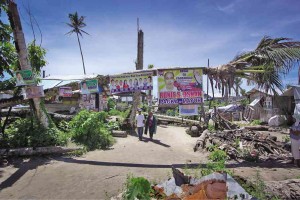
ISLANDERS’ HOPE Amid destruction left by Typhoon “Pablo,” voters in Poo, an islet in Barangay Kinablangan in Baganga town, Davao Oriental, go to their poll precinct. KARLOS MANLUPIG/INQUIRER MINDANAO
BAGANGA, Davao Oriental—For survivors of Typhoon “Pablo,” election also means payback time.
In Poo, an islet off the coast of Barangay (village) Kinablangan here, residents said they would not vote for candidates and politicians who are involved in logging and mining activities.
“Naturally, we will not vote for them because they are the perpetrators behind the unimaginable devastation brought by Typhoon Pablo,” barangay councilor Adelaida Samuya said. Pablo caused widespread destruction to this town and its neighbors in Compostela Valley when it struck on Dec. 4 last year.
The people have complained about the poor delivery of relief and rehabilitation services to their community. They were offended when the government declared their place uninhabited and a no-build zone.
For Antonio Lubreo, a fisherman in Isla Poo, the most logical thing that the government must do is to provide fishing implements to the almost 1,000 residents. “We live on fishing but we were paralyzed when Typhoon Pablo took our small fishing boats away. A small boat per family is enough to help us,” he said.
Lubreo, a recipient of a banca donated by private groups, said it would be better if the government itself would provide lifelines to the people.
Poo still manifests the destructive strength of Pablo. Many people occupy shacks built from wood retrieved from their original houses. Uprooted coconut trees are strewn everywhere while those still upright are unproductive.
Not far from the landing zone of small fishing vessels, a chugging sound can be heard from one of the two rooms of Poo Elementary School that the typhoon spared. A small generator set provides power to a precinct count optical scan (PCOS) machine, which serves the entire island.
But the problem is that fuel is only enough for the machine to run for four hours. Jennifer Ibañez, Board of Election Inspectors chair of the precinct, said she had already requested the Commission on Elections (Comelec) to provide more fuel.
In the village of Lambajon, Leonera Advincula, 60, had just finished shading her ballot and limped her way to the PCOS machine. “You see this wound in my right foot? Typhoon Pablo caused this. I stepped on a nail during the storm,” she said.
Advincula said she was ignoring the pain because she was eager to cast her vote. For her, the election was a way for the people to have their voices heard.
In New Bataan town in Compostela Valley, which was hit the hardest by the typhoon, some survivors said they did not believe that the outcome of the election would change their situation.
The candidates could not provide their needs, said Renato Tabino, 45, whose family is among the 25 others still staying in the “tent city” at the back of the Catholic church.
Tabino said his vote would not be based on the promises made by the candidates, but on their capability and track record.
“Besides, they cannot really help me this time,” he added.
What used to be Tabino’s 4-hectare farm and home in Barangay Andap is now part of a big river that was formed after the typhoon. He is still waiting for the construction of a new home in a relocation site.
“The houses were donated by NGOs (nongovernment organizations), not by politicians,” Tabino said. The same groups have been helping them since the typhoon destroyed most of their village.
The Comelec office in New Bataan has highlighted with blue ink the names of 48 registered voters who died during the floods brought about by the typhoon. The number, however, is small compared to the hundreds who were killed or have remained missing.